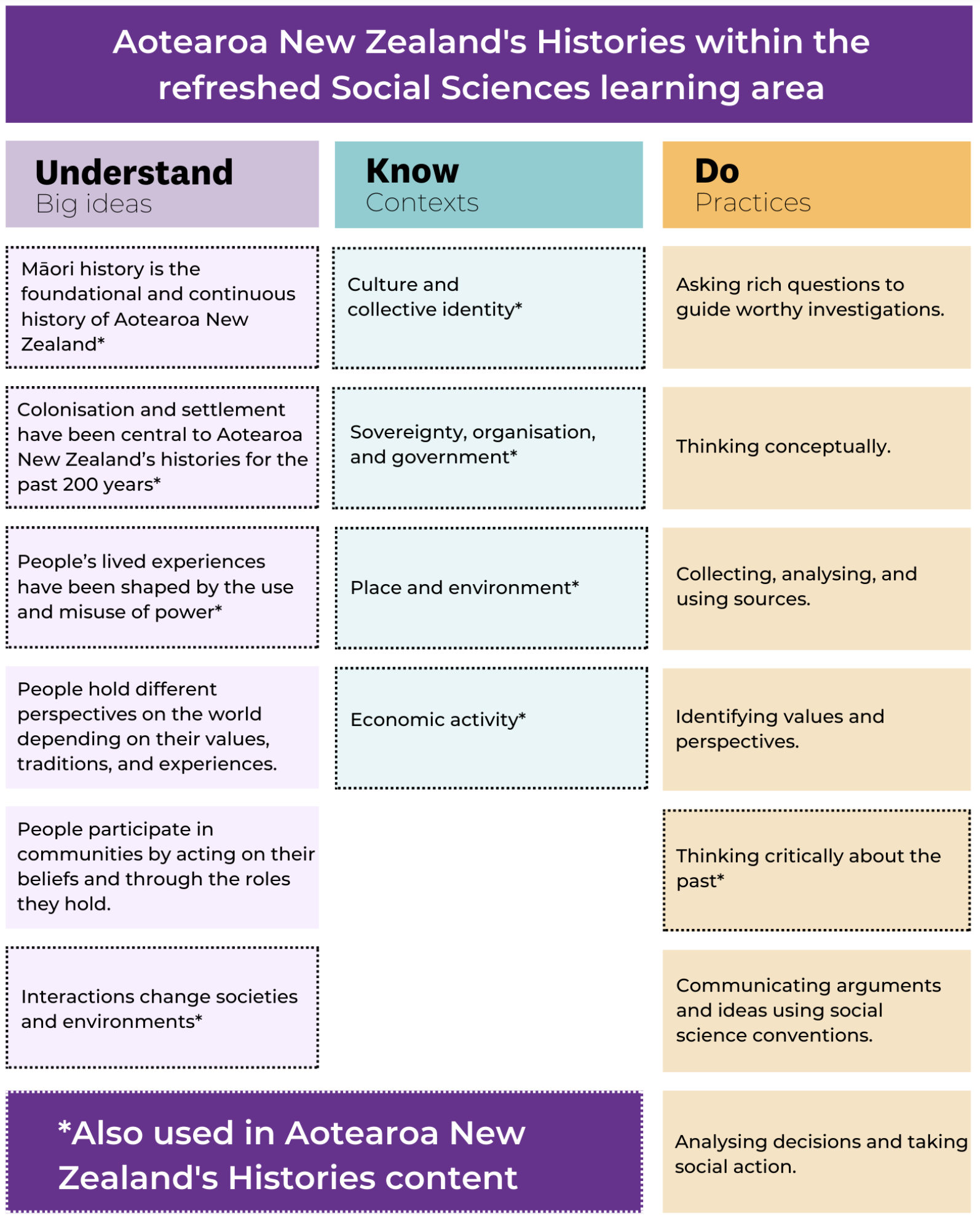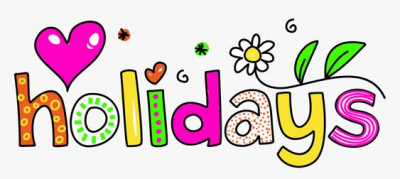9F2 Global Studies
Section outline
-
Kia ora, welcome to your Global Studies 2024 Course Page!
Ko Mrs Chamberlin toku ingoa. I will be your Global Studies teacher this year.
You can email me schamberlin@mhjc.school.nz or visit me in my class F6.
Please check MHO regularly for activities and planning. Your assessments will be linked here, at the top of the MHO page.
For Global Studies this year you will need:
- Device and a lined exercise book
- Pens, glue, ruler, colouring-in pencils and a highlighter
You need to get these ready when you are waiting in a line outside F6.
Once invited in, you need to put your bag in the bag cupboard. You then need to read and record the Date, Learning Intentions, Success Criteria & 'Do Now' activity in your exercise book.
This will be our routine and I expect not to ask you to do this, but for you to manage yourself to action this at the start of every session. 😃👍
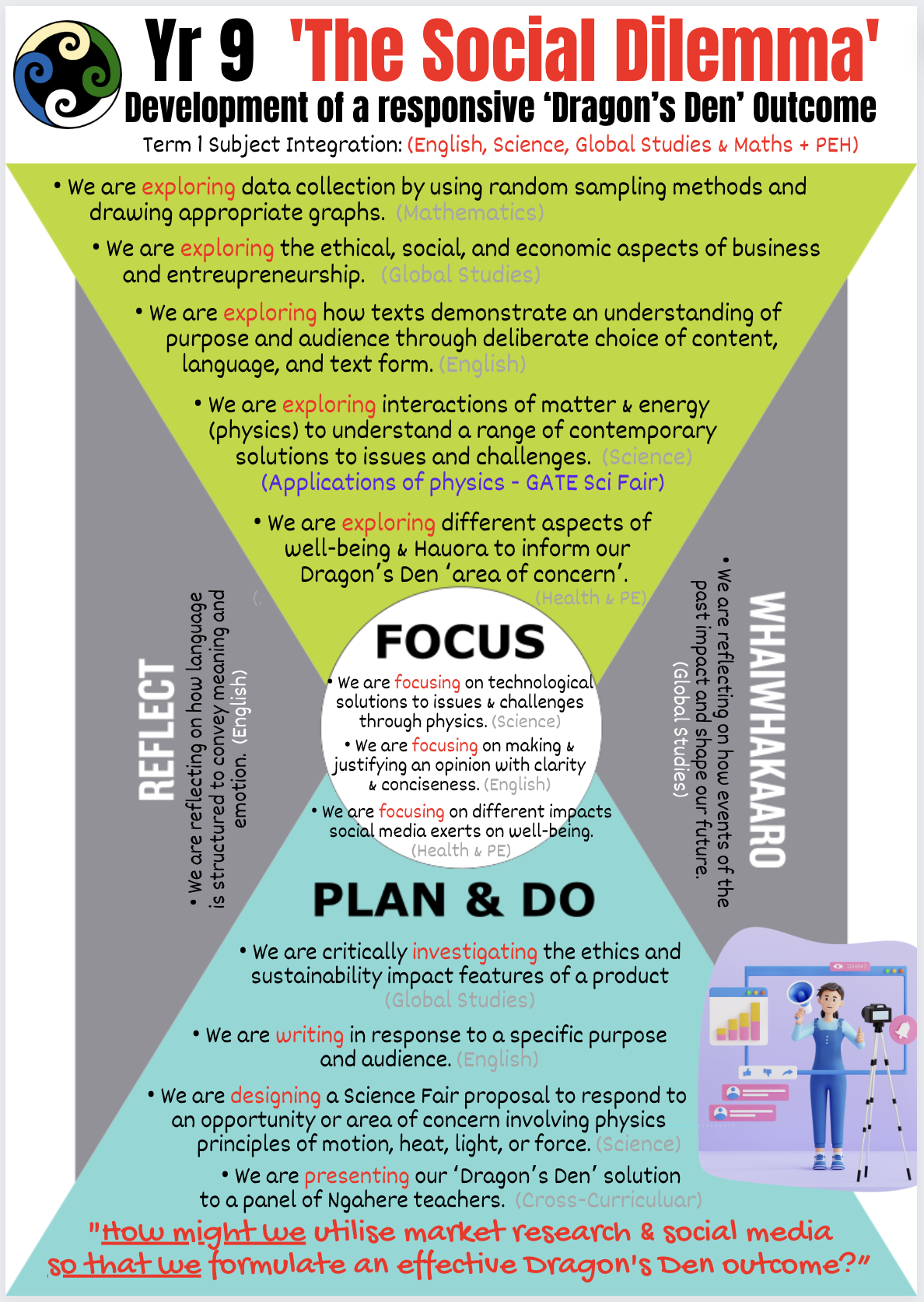
- Device and a lined exercise book
-
EXPLORE / TŪHURA learning intentions:
- We are EXPLORING an area of concern or opportunity by defining needs and wants
- We are EXPLORING possible Dragon's Den needs and/or opportunities by explaining the role of consumers and producers
- We are EXPLORING a range of Dragon's Den solutions to illustrate the flow of goods, services & resources
- We are EXPLORING whether innovation, entrepreneurship, and financial skills create new chances/opportunities
- We are EXPLORING whether opportunities can enrich or damage lives, challenge views about needs and wants, and impact sustainability
- We are EXPLORING whether opportunities improve or harm lives and alter perspectives on needs and wants
- We are FOCUSING on optimising resource allocation and sustainability by identifying the relationship between supply and demand
- We are FOCUSING on enhancing financial transparency and accountability by recognising individual and company tax obligations
- We are FOCUSING on promoting socioeconomic equity by connecting the tax system to government functions
Kia ora! This week Miss Steel will be supporting your introduction to Global Studies '24 and your exciting Term One learning context!
Context: 'The Social Dilemma' - Economic interdependence & vulnerability (Dragon's Den outcome)
Through innovation, enterprise, & financial capability, individuals, communities, & societies create new opportunities. These opportunities can enrich or damage lives, challenge views about needs & wants, and impact on sustainability.
MHJC Values: Awhinatanga/Compassion: Positive partnershipsPaearu Angitu: (Success Criteria): I can...
Hei Mahi (Activities):
- Session 1: Welcome to Global Studies '24! 'Do Now:' Classroom learning routines (Miss Steel's slideshow Pg's 1 to 11).
- Register to join 9F2's Google Classroom page: epxgbsz
Do Now: 'Current Events Quiz'.
- Yesterday's Waitangi Day public holiday commemorated the signing of 'Te Tiriti o Waitangi' the Treaty of Waitangi. On Google Classroom, view the 5-minute video "Let Me Explain: Te Tiriti o Waitangi." Class discussion, 'Why is the Treaty a controversial document?' Class discussion re: Who are the different stakeholders here?
- Session 2: Do Now: '4-Minute Visual History' video (discussion).
- Navigate to the Te Ara: 'Te Tiriti o Waitangi' to complete the fishbone research task - refer to Google Classroom.
'Te Ara' in Māori means 'the pathway'. Te Ara – The Encyclopedia of New Zealand offers many pathways to understanding Aotearoa New Zealand. It is a comprehensive guide to the country's peoples, natural environment, history, culture, economy, institutions and society.
Please use a ruler to draw and complete the fishbone graphic organiser on a whole page of your Global Studies exercise book. Miss Steel will inform you whether reading is a shared whole class task, buddy or individual activity. Please include the key phrases: 'Spirit of the Treaty' then 'Kāwanatanga' + 'Sovereignty' under the '3 Articles of Te Tiriti' note-taking headings.
* The weblinks are not 'live' on the fishbone diagram but are listed below:
a. - https://teara.govt.nz/en/te-tiriti-o-waitangi-the-treaty-of-waitangi/print (Te Ara)
b. - . (Highly Contentious)
c. - https://www.1news.co.nz/2024/01/19/leaked-ministry-doc-warns-bill-could-break-spirit-and-text-of-treaty/ (Spirit of the Treaty) 
- Session 3: 'Do Now: '3-Minute Visual History' video of the voyages of Te Tiriti o Waitangi (discussion).
- 'Kahoot 'Treaty of Waitangi' by Whaea Katarena. Insert link here...
- Discussion map splintered research activity - write your name in one square on the whiteboard. Be ready to share your brief answer from your exercise book orally with the class.
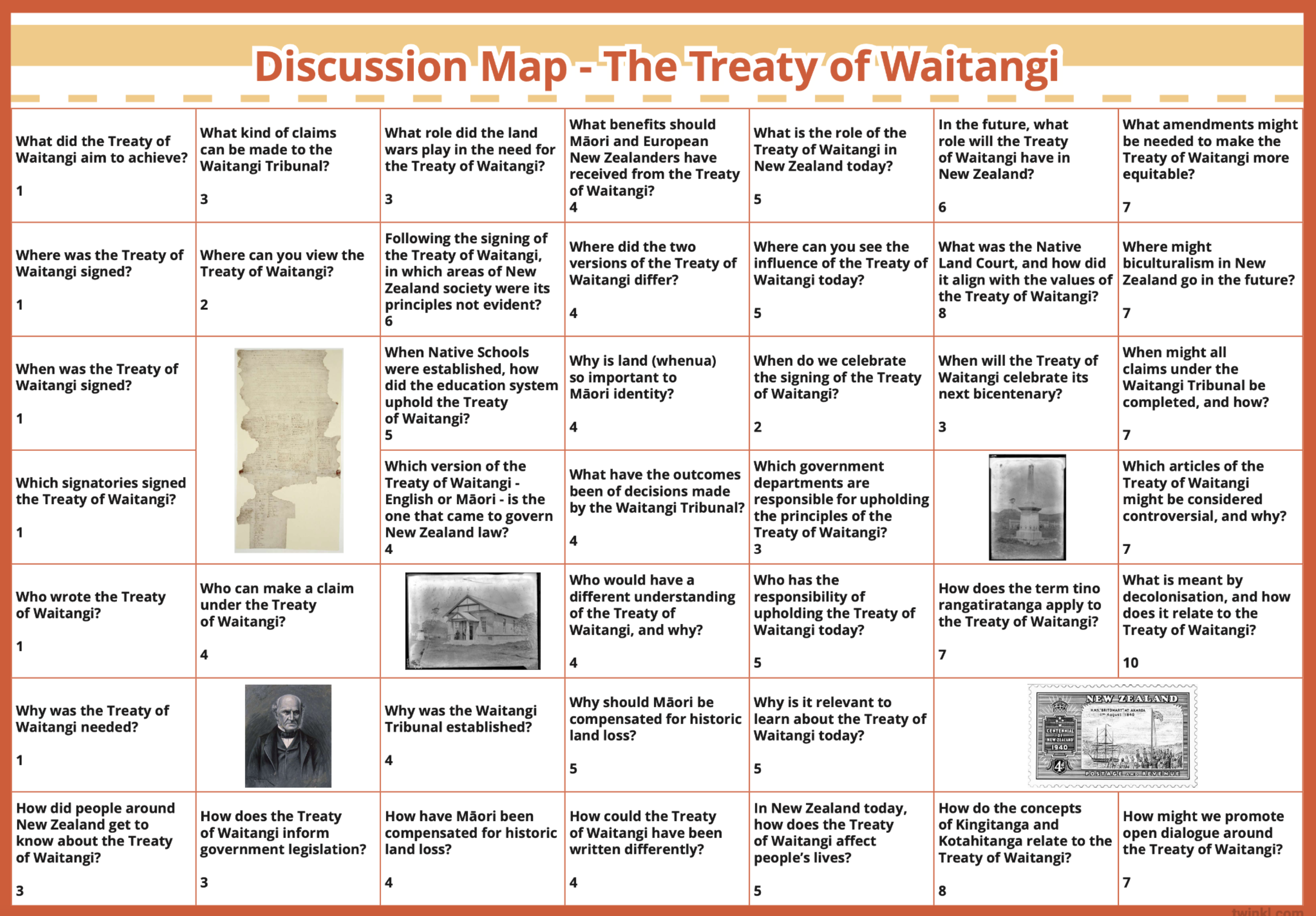
- Fast finishers, using the information presented in the School journal, 'Te Tiriti o Waitangi' pdf and the most current Treaty developments in the media, construct a 'Te Tiriti o Waitangi' timeline on Canva.
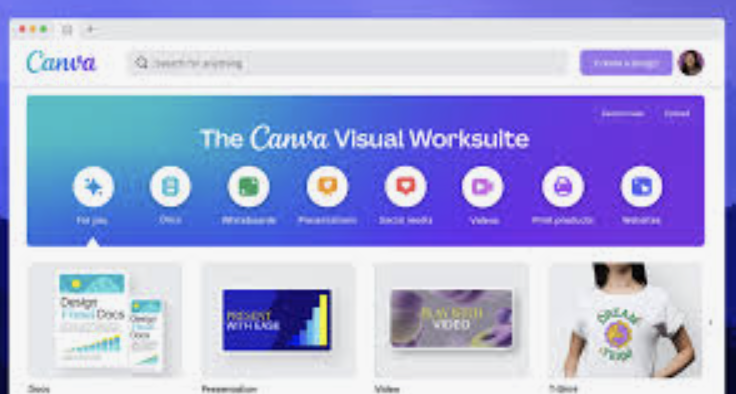
Mahi Kāinga (Homework/Further Learning):
Please continue working on your 'Te Tiriti o Waitangi' timeline on Canva for homework this week. Export your completed timeline as a pdf and submit onto Google Classroom for marking by Friday of Week 3.
-
EXPLORE / TŪHURA learning intentions:
- We are EXPLORING an area of concern or opportunity by defining needs and wants
- We are EXPLORING possible Dragon's Den needs and/or opportunities by explaining the role of consumers and producers
- We are EXPLORING a range of Dragon's Den solutions to illustrate the flow of goods, services & resources
- We are EXPLORING whether innovation, entrepreneurship, and financial skills create new chances/opportunities
- We are EXPLORING whether opportunities can enrich or damage lives, challenge views about needs and wants, and impact sustainability
- We are EXPLORING whether opportunities improve or harm lives and alter perspectives on needs and wants
- We are FOCUSING on optimising resource allocation and sustainability by identifying the relationship between supply and demand
- We are FOCUSING on enhancing financial transparency and accountability by recognising individual and company tax obligations
- We are FOCUSING on promoting socioeconomic equity by connecting the tax system to government functions
MHJC Values: Awhinatanga/Compassion: Positive partnerships Paearu Angitu: (Success Criteria): I can...
Hei Mahi (Activities):
- Dilemma's in our community - class brainstorm and discussion
- Decide on your dilemma that you want to solve and begin your research
- Innovation Bachelor - research innovators who have tackled and helped solve a dilemma in the community.
- Note taking & fact checking during the presentations
-
EXPLORE / TŪHURA learning intentions:
- We are EXPLORING an area of concern or opportunity by defining needs and wants
- We are EXPLORING possible Dragon's Den needs and/or opportunities by explaining the role of consumers and producers
- We are EXPLORING a range of Dragon's Den solutions to illustrate the flow of goods, services & resources
- We are EXPLORING whether innovation, entrepreneurship, and financial skills create new chances/opportunities
- We are EXPLORING whether opportunities can enrich or damage lives, challenge views about needs and wants, and impact sustainability
- We are EXPLORING whether opportunities improve or harm lives and alter perspectives on needs and wants
- We are FOCUSING on optimising resource allocation and sustainability by identifying the relationship between supply and demand
- We are FOCUSING on enhancing financial transparency and accountability by recognising individual and company tax obligations
- We are FOCUSING on promoting socioeconomic equity by connecting the tax system to government functions
MHJC Values: Awhinatanga/Compassion: Positive partnerships Paearu Angitu: (Success Criteria): I can...
Hei Mahi (Activities):
- Dragon's Den research project
- Weekly Quiz
-
EXPLORE / TŪHURA learning intentions:
- We are EXPLORING an area of concern or opportunity by defining needs and wants
- We are EXPLORING possible Dragon's Den needs and/or opportunities by explaining the role of consumers and producers
- We are EXPLORING a range of Dragon's Den solutions to illustrate the flow of goods, services & resources
- We are EXPLORING whether innovation, entrepreneurship, and financial skills create new chances/opportunities
- We are EXPLORING whether opportunities can enrich or damage lives, challenge views about needs and wants, and impact sustainability
- We are EXPLORING whether opportunities improve or harm lives and alter perspectives on needs and wants
- We are FOCUSING on optimising resource allocation and sustainability by identifying the relationship between supply and demand
- We are FOCUSING on enhancing financial transparency and accountability by recognising individual and company tax obligations
- We are FOCUSING on promoting socioeconomic equity by connecting the tax system to government functions
MHJC Values: Awhinatanga/Compassion: Positive partnerships Paearu Angitu: (Success Criteria): I can...
Hei Mahi (Activities):
- Economics keywords activity
- Economy discussion
- Economics concepts worksheet
- Weekly Quiz!
-
FOCUS / ARONGA learning intentions:
- We are FOCUSING on innovation in the NZ economy by defining the industries in terms of goods, services & resources as well as their contribution to production & income
- We are FOCUSING on innovation in the NZ economy by describing our own entrepreneurial characteristics/skills
- We are FOCUSING on innovation in the NZ economy by explaining technological advancements in New Zealand
- We are FOCUSING on innovation in the NZ economy by discussing the case studies of government land acquisition
- We are FOCUSING on innovation in the NZ economy by comparing the NZ workforce - past, present, future
Success Criteria

Activities
- Education Perfect - Economic History of NZ
- SEXY paragraph writing - economic history
- Weekly quiz!
-
FOCUS / ARONGA learning intentions:
- We are FOCUSING on innovation in the NZ economy by defining the industries in terms of goods, services & resources as well as their contribution to production & income
- We are FOCUSING on innovation in the NZ economy by describing our own entrepreneurial characteristics/skills
- We are FOCUSING on innovation in the NZ economy by explaining technological advancements in New Zealand
- We are FOCUSING on innovation in the NZ economy by discussing the case studies of government land acquisition
- We are FOCUSING on innovation in the NZ economy by comparing the NZ workforce - past, present, future
Success Criteria

Activities
- Aotearoa History show - Number 8 wire
- SEXY paragraph writing - Kiwi innovations
- Weekly quiz!
- Dragons Den innovation preparation
-
FOCUS / ARONGA learning intentions:
- We are FOCUSING on innovation in the NZ economy by defining the industries in terms of goods, services & resources as well as their contribution to production & income
- We are FOCUSING on innovation in the NZ economy by describing our own entrepreneurial characteristics/skills
- We are FOCUSING on innovation in the NZ economy by explaining technological advancements in New Zealand
- We are FOCUSING on innovation in the NZ economy by discussing the case studies of government land acquisition
- We are FOCUSING on innovation in the NZ economy by comparing the NZ workforce - past, present, future
Success Criteria

Activities
- Dragons Den innovation preparation
- Weekly quiz!
-
EXPLORE / TŪHURA learning intentions:
- We are EXPLORING an area of concern or opportunity by defining needs and wants
- We are EXPLORING possible Dragon's Den needs and/or opportunities by explaining the role of consumers and producers
- We are EXPLORING a range of Dragon's Den solutions to illustrate the flow of goods, services & resources
- We are EXPLORING whether innovation, entrepreneurship, and financial skills create new chances/opportunities
- We are EXPLORING whether opportunities can enrich or damage lives, challenge views about needs and wants, and impact sustainability
- We are EXPLORING whether opportunities improve or harm lives and alter perspectives on needs and wants
- We are FOCUSING on optimising resource allocation and sustainability by identifying the relationship between supply and demand
- We are FOCUSING on enhancing financial transparency and accountability by recognising individual and company tax obligations
- We are FOCUSING on promoting socioeconomic equity by connecting the tax system to government functions
MHJC Values: Awhinatanga/Compassion: Positive partnerships Paearu Angitu: (Success Criteria): I can...
Hei Mahi (Activities):
- Dragon's Den research project
- Weekly Quiz
- Education Perfect task
-
EXPLORE / TŪHURA learning intentions:
- We are EXPLORING an area of concern or opportunity by defining needs and wants
- We are EXPLORING possible Dragon's Den needs and/or opportunities by explaining the role of consumers and producers
- We are EXPLORING a range of Dragon's Den solutions to illustrate the flow of goods, services & resources
- We are EXPLORING whether innovation, entrepreneurship, and financial skills create new chances/opportunities
- We are EXPLORING whether opportunities can enrich or damage lives, challenge views about needs and wants, and impact sustainability
- We are EXPLORING whether opportunities improve or harm lives and alter perspectives on needs and wants
- We are FOCUSING on optimising resource allocation and sustainability by identifying the relationship between supply and demand
- We are FOCUSING on enhancing financial transparency and accountability by recognising individual and company tax obligations
- We are FOCUSING on promoting socioeconomic equity by connecting the tax system to government functions
MHJC Values: Awhinatanga/Compassion: Positive partnerships Paearu Angitu: (Success Criteria): I can...
Hei Mahi (Activities):
- Introduction to Entrepreneurship activity
- Mix & Match activity
- Word-search
- Weekly quiz
- Reducing our footprint - read the article & complete the comprehension activity
-
EXPLORE / TŪHURA learning intentions:
- We are EXPLORING an area of concern or opportunity by defining needs and wants
- We are EXPLORING possible Dragon's Den needs and/or opportunities by explaining the role of consumers and producers
- We are EXPLORING a range of Dragon's Den solutions to illustrate the flow of goods, services & resources
- We are EXPLORING whether innovation, entrepreneurship, and financial skills create new chances/opportunities
- We are EXPLORING whether opportunities can enrich or damage lives, challenge views about needs and wants, and impact sustainability
- We are EXPLORING whether opportunities improve or harm lives and alter perspectives on needs and wants
- We are FOCUSING on optimising resource allocation and sustainability by identifying the relationship between supply and demand
- We are FOCUSING on enhancing financial transparency and accountability by recognising individual and company tax obligations
- We are FOCUSING on promoting socioeconomic equity by connecting the tax system to government functions
MHJC Values: Awhinatanga/Compassion: Positive partnerships Paearu Angitu: (Success Criteria): I can...
Hei Mahi (Activities):
- Reducing our footprint - read the article & complete the comprehension activity
- Weekly quiz!
- This week in history task
-

Kia ora! This week we are exploring the story of a great rangatira who held great mana.
EXPLORE / TŪHURA learning intentions:
- We are EXPLORING case studies of mana-enhancing enterprise
- We are EXPLORING people’s values, viewpoints, and perspectives, including my own
- We are EXPLORING how language and messaging can be used to inform, to misinform, and to position people alongside particular values and perspectives.
- We are EXPLORING relationships between events and identify continuity or changes in relationships.
- We are EXPLORING people’s actions in the past based on historical evidence and taking account of the attitudes and values of the times, the challenges people faced, and the information available to them.
- We are EXPLORING conceptual understandings across contexts and case studies in order to develop generalisations.
- We are EXPLORING concepts and understandings that may be contested and mean different things to different groups.
- We are EXPLORING and processing information, using social science conventions and literacy and numeracy tools to help organise research.
- We are EXPLORING values behind diverse perspectives within and between groups, and explaining the implications of missing perspectives.
- We are EXPLORING attempts to influence or manipulate people’s values, perspectives, and action.
Authentic Outcomes: ‘Enterprise at the Ormiston Marketplace’
Theme: Resilience/empowerment/perseverance
Whakatauki: "He iti te mokoroa, nāna i kati te kahikatea ."
Metaphorical: The mokoroa (grub) may be small, but it cuts through the Kahikatea
Literal: This whakatauki reflects that small things can have a great impact. It encourages us to think big. Although numbers or resources may be small, like the mokoroa, it is possible to achieve great tasks/achievements.Paearu Angitu (Success Criteria): I can...
• Locate information in a text
• Define key terms
• Examine values, viewpoints, and perspectivesHei Mahi (Activities):
2. In pairs, read the journal article: 'Eruera Maihi Patuone: The Story of a Great Rangatirau' attached as a pdf, below.
1. Eruera Maihi Patuone lived to be 108 (some say he was 112). Over his long life, he would witness enormous change. Patuone was a boy when Captain Cook first arrived, and he was one of the first rangatira to sign Te Tiriti o Waitangi. As a warrior, he fought with both traditional weapons and muskets. Later in life, he became a peacemaker. Like his cousin Hongi Hika, Patuone was a descendant of Rāhiri, who in turn descended from Kupe.
3. Discuss the Key Terms: ancestral wisdom, biography, Captain Cook, heritage, leadership, Musket Wars, New Zealand Wars, Northern War, power, rangatira, rangatiratanga.
4. In exercise books, write the short date, heading and full answers to a). Quick Find, b). Reading between the lines, and c). '50 Words'.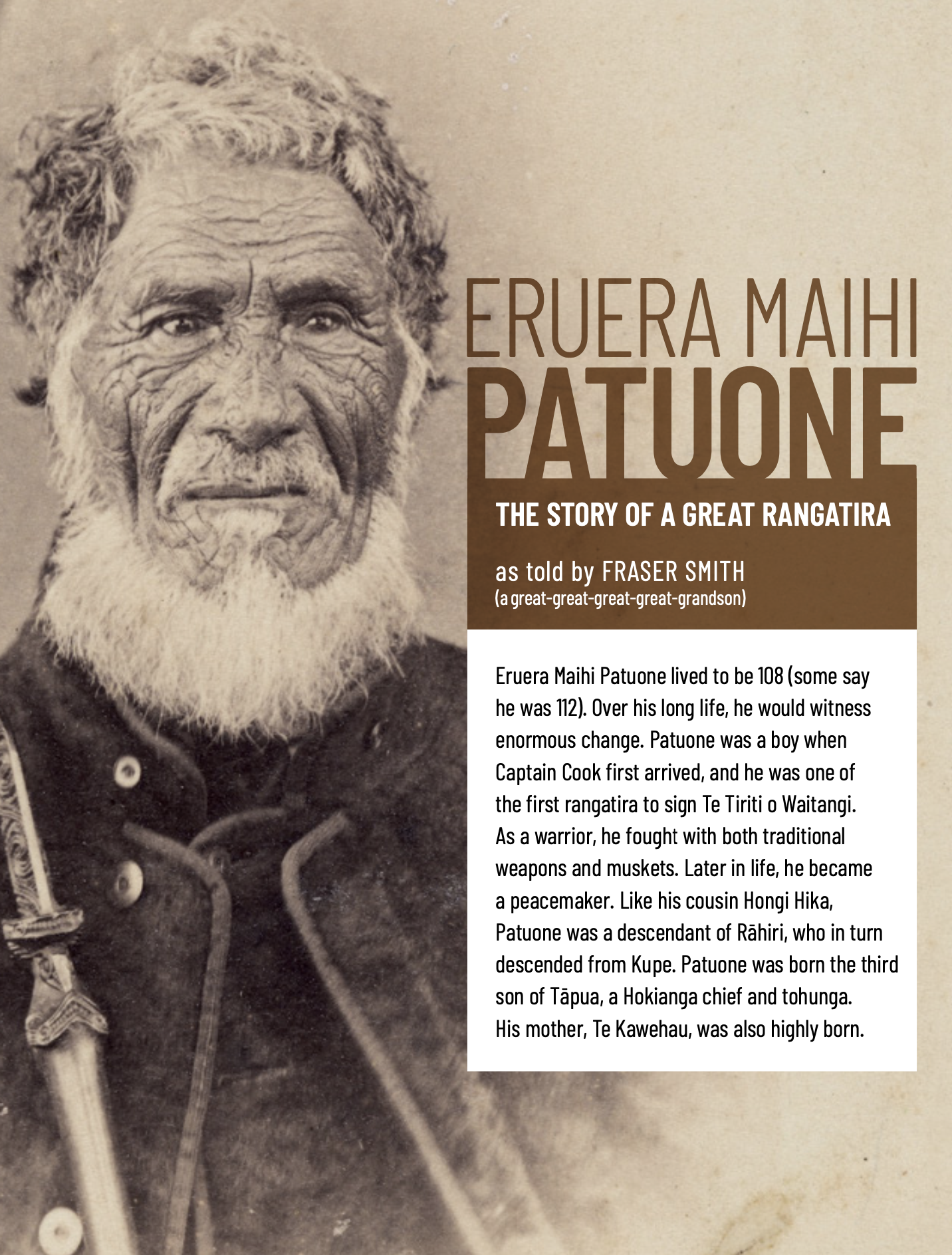

-
Kia ora! This week we are exploring the story of one of the first Maori suffragists, Meri Te Tai Mangakahia. Meri Te Tai made an enormous contribution to advancing women's equality in Aotearoa through the women's suffrage movement, and more. Well ahead of her time, Meri Te Tai Mangakahia wanted more than the right to vote, she wanted women represented in Parliament to be part of the decision-making and able to exercise mana through improved economic relationships.
EXPLORE / TŪHURA learning intentions:
- We are EXPLORING case studies of mana-enhancing enterprise
- We are EXPLORING people’s values, viewpoints, and perspectives, including my own
- We are EXPLORING how language and messaging can be used to inform, to misinform, and to position people alongside particular values and perspectives.
- We are EXPLORING relationships between events and identify continuity or changes in relationships.
- We are EXPLORING people’s actions in the past based on historical evidence and taking account of the attitudes and values of the times, the challenges people faced, and the information available to them.
- We are EXPLORING conceptual understandings across contexts and case studies in order to develop generalisations.
- We are EXPLORING concepts and understandings that may be contested and mean different things to different groups.
- We are EXPLORING and processing information, using social science conventions and literacy and numeracy tools to help organise research.
- We are EXPLORING values behind diverse perspectives within and between groups, and explaining the implications of missing perspectives.
- We are EXPLORING attempts to influence or manipulate people’s values, perspectives, and action.
Authentic Outcomes: ‘Enterprise at the Ormiston Marketplace’
Theme: Resilience/empowerment/perseverance
Whakatauki: "He iti te mokoroa, nāna i kati te kahikatea ."
Metaphorical: The mokoroa (grub) may be small, but it cuts through the Kahikatea
Literal: This whakatauki reflects that small things can have a great impact. It encourages us to think big. Although numbers or resources may be small, like the mokoroa, it is possible to achieve great tasks/achievements.Paearu Angitu (Success Criteria): I can...
• Locate information in a text
• Define key terms
• Examine values, viewpoints, and perspectives
• Construct a timeline to display a mana-enhancing event/s (leadership, change & economic relationships)Hei Mahi (Activities):
1. Complete Term 2, Week 2's General Knowledge Quiz.
a). Words from Meri Te Tai Mangakāhia: Māori Suffragist
2. Read the two short extracts below on Meri Te Tai Mangakahia one of New Zealand's first Maori suffragists.
b). Kia Kaha profile - Meri Te Tai Mangakāhia
3. Complete the following Cloze learning activity about Meri Te Tai Mangakahia on Google Classroom by inserting the appropriate key word from the word bank onto the document (Google Classroom).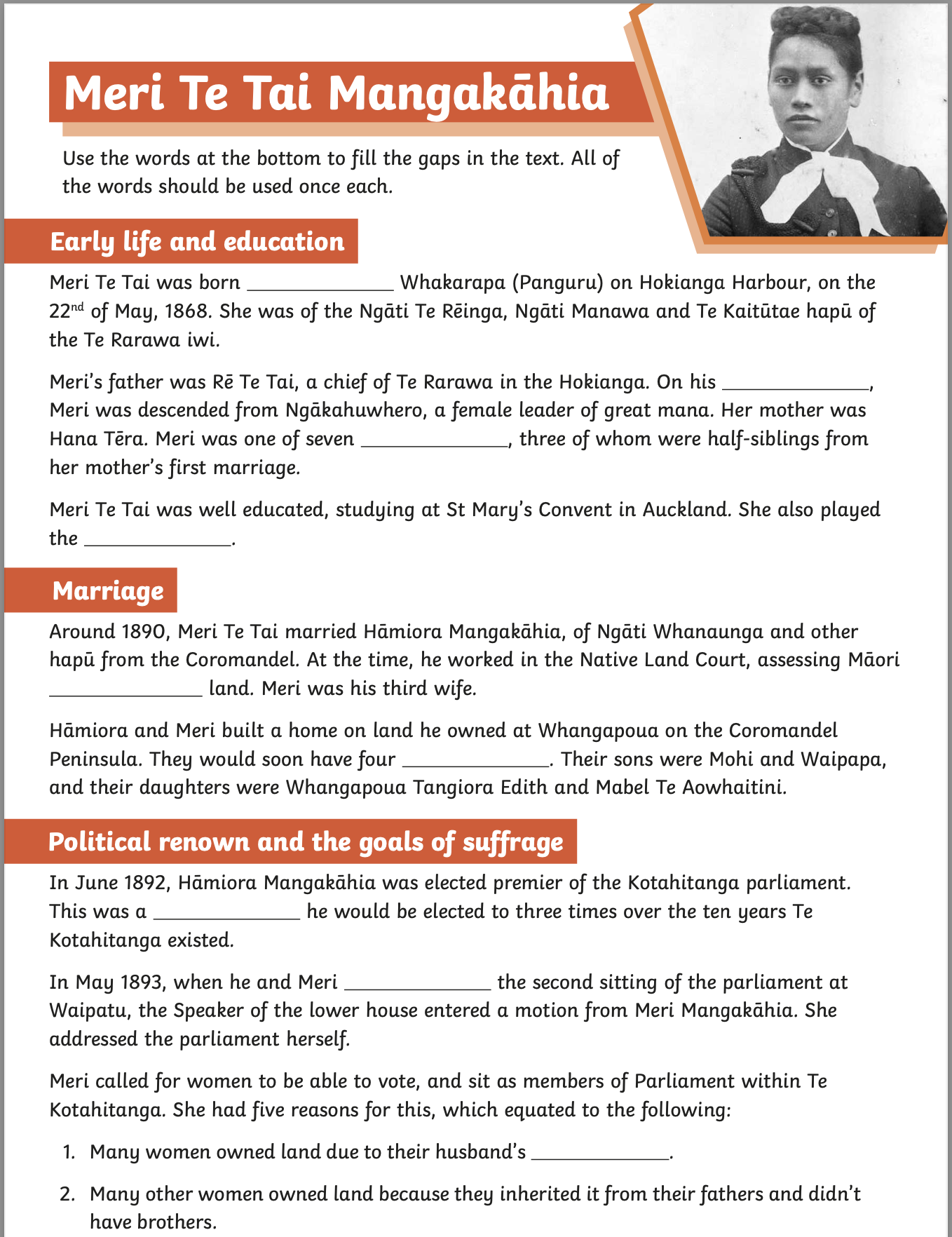
4. Craft a timeline of Meri Te Tai Mangakahia's life and achievements on Canva. The Te Ara Encyclopaedia will prove to be a useful start to your research of key dates & events: Te Ara - Encyclopaedia of NZ - Meri Te Tai Mangakāhia
5. Special Guests: Listen to Meri Te Tai Mangakahia's great grand niece Emma Frost (radio interview) with descendants Jeremy Adams & Daymon Adams. Discuss values, viewpoints, and perspectives of land loss, and Māori women’s ownership and control of land was one reason why they needed to take part in discussion, decision-making and leadership. Discuss how people’s actions in the past based on historical evidence and taking account of the attitudes and values of the times, the challenges people faced, and the information available to them and how language and messaging can be used to inform, to misinform, and to position people alongside particular values and perspectives.
Revisit your timeline to ensure your have captured Meri Te Tai Mangakahia's values, viewpoints, challenges and perspectives.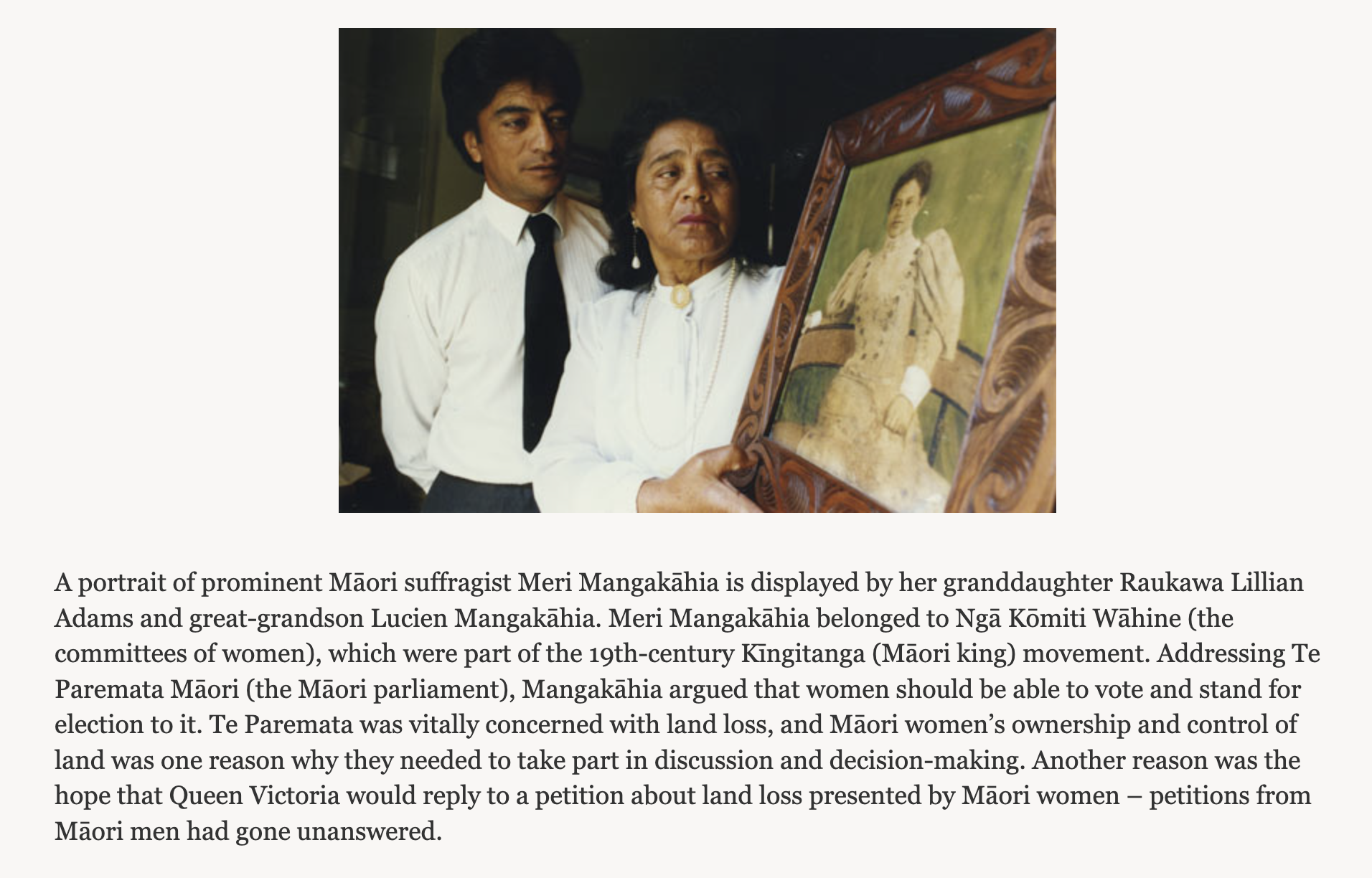

-
Kia ora! This week we are defining, what is an entrepreneur, explaining the difference between invention and innovation, and determining the skills necessary to be a successful entrepreneur.
EXPLORE / TŪHURA learning intentions:
- We are EXPLORING case studies of mana-enhancing enterprise
- We are EXPLORING people’s values, viewpoints, and perspectives, including my own
- We are EXPLORING how language and messaging can be used to inform, to misinform, and to position people alongside particular values and perspectives.
- We are EXPLORING relationships between events and identify continuity or changes in relationships.
- We are EXPLORING people’s actions in the past based on historical evidence and taking account of the attitudes and values of the times, the challenges people faced, and the information available to them.
- We are EXPLORING conceptual understandings across contexts and case studies in order to develop generalisations.
- We are EXPLORING concepts and understandings that may be contested and mean different things to different groups.
- We are EXPLORING and processing information, using social science conventions and literacy and numeracy tools to help organise research.
- We are EXPLORING values behind diverse perspectives within and between groups, and explaining the implications of missing perspectives.
- We are EXPLORING attempts to influence or manipulate people’s values, perspectives, and action.
Authentic Outcomes: ‘Enterprise at the Ormiston Marketplace’
Theme: Resilience/empowerment/perseverance
Whakatauki: "He iti te mokoroa, nāna i kati te kahikatea ."
Metaphorical: The mokoroa (grub) may be small, but it cuts through the Kahikatea
Literal: This whakatauki reflects that small things can have a great impact. It encourages us to think big. Although numbers or resources may be small, like the mokoroa, it is possible to achieve great tasks/achievements.Paearu Angitu (Success Criteria): I can...
• Locate information in a text
• Define key terms: innovation, entrepreneur and invention
• Examine values, viewpoints, and perspectives
• Recognise opportunities for invention, innovation and enterpriseHei Mahi (Activities):
1. Complete Term 2, Week 3's General Knowledge Quiz.
2. Navigate to Google Classroom and open the document titled, 'Entrepreneurship'. Read through task instructions as a class.
3. List the characteristics of an entrepreneur.
4. Research, who is the youngest billionaire at the moment?
5. What is invention versus innovation?
6. Who is New Zealand's savviest entrepreneur? Complete questions #1-5 and then the task on Pg's 3-4.
-
Kia ora! This week we are continuing our exploration of "What is an Entrepreneur?" defining what is an entrepreneur, explaining the difference between invention and innovation, and determining the skills necessary to be a successful entrepreneur.
EXPLORE / TŪHURA learning intentions:
- We are EXPLORING case studies of mana-enhancing enterprise
- We are EXPLORING people’s values, viewpoints, and perspectives, including my own
- We are EXPLORING how language and messaging can be used to inform, to misinform, and to position people alongside particular values and perspectives.
- We are EXPLORING relationships between events and identify continuity or changes in relationships.
- We are EXPLORING people’s actions in the past based on historical evidence and taking account of the attitudes and values of the times, the challenges people faced, and the information available to them.
- We are EXPLORING conceptual understandings across contexts and case studies in order to develop generalisations.
- We are EXPLORING concepts and understandings that may be contested and mean different things to different groups.
- We are EXPLORING and processing information, using social science conventions and literacy and numeracy tools to help organise research.
- We are EXPLORING values behind diverse perspectives within and between groups, and explaining the implications of missing perspectives.
- We are EXPLORING attempts to influence or manipulate people’s values, perspectives, and action.
Authentic Outcomes: ‘Enterprise at the Ormiston Marketplace’
Theme: Resilience/empowerment/perseverance
Whakatauki: "He iti te mokoroa, nāna i kati te kahikatea ."
Metaphorical: The mokoroa (grub) may be small, but it cuts through the Kahikatea
Literal: This whakatauki reflects that small things can have a great impact. It encourages us to think big. Although numbers or resources may be small, like the mokoroa, it is possible to achieve great tasks/achievements.Paearu Angitu (Success Criteria): I can...
• Locate information in a text
• Define key terms innovation, Entrepreneur and invention
• Examine values, viewpoints, and perspectives
• I can recognise opportunities for invention, innovation and enterpriseHei Mahi (Activities):
1. Complete Term 2, Week 4's General Knowledge Quiz.
2. Navigate to Google classroom and open the document titled,: "Entrepreneurship". Read through task instructions as a class.
3. List the characteristics of an Entrepreneur.
4. Research who is the youngest billionaire at the moment.
5. What is invention versus innovation?
6. Who is New Zealand's savviest Entrepreneur? Complete questions in task #1-5 and then the task on Pg's 3-4.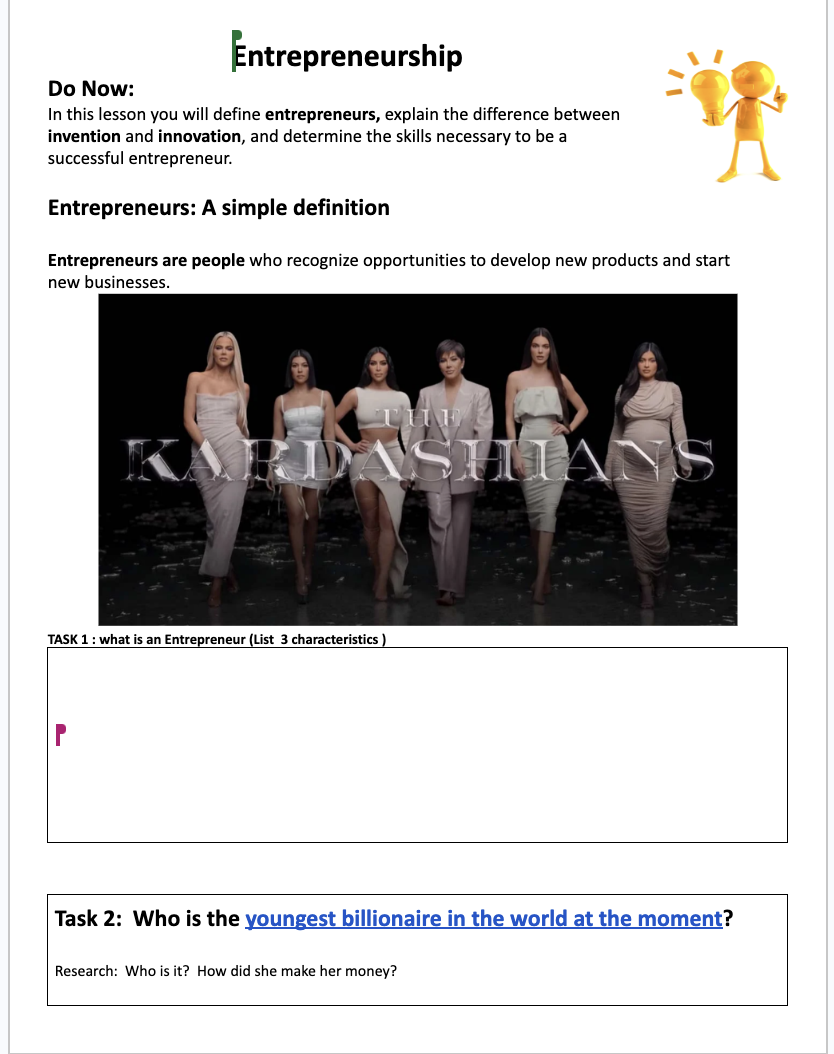
-
Kia ora! This week we are continuing our exploration of "What is an Entrepreneur?" defining what is an entrepreneur, explaining the difference between invention and innovation, and determining the skills necessary to be a successful entrepreneur.
EXPLORE / TŪHURA learning intentions:
- We are EXPLORING case studies of mana-enhancing enterprise
- We are EXPLORING people’s values, viewpoints, and perspectives, including my own
- We are EXPLORING how language and messaging can be used to inform, to misinform, and to position people alongside particular values and perspectives.
- We are EXPLORING relationships between events and identify continuity or changes in relationships.
- We are EXPLORING people’s actions in the past based on historical evidence and taking account of the attitudes and values of the times, the challenges people faced, and the information available to them.
- We are EXPLORING conceptual understandings across contexts and case studies in order to develop generalisations.
- We are EXPLORING concepts and understandings that may be contested and mean different things to different groups.
- We are EXPLORING and processing information, using social science conventions and literacy and numeracy tools to help organise research.
- We are EXPLORING values behind diverse perspectives within and between groups, and explaining the implications of missing perspectives.
- We are EXPLORING attempts to influence or manipulate people’s values, perspectives, and action.
Authentic Outcomes: ‘Enterprise at the Ormiston Marketplace’
Theme: Resilience/empowerment/perseverance
Whakatauki: "He iti te mokoroa, nāna i kati te kahikatea ."
Metaphorical: The mokoroa (grub) may be small, but it cuts through the Kahikatea
Literal: This whakatauki reflects that small things can have a great impact. It encourages us to think big. Although numbers or resources may be small, like the mokoroa, it is possible to achieve great tasks/achievements.Paearu Angitu (Success Criteria): I can...
• Locate information in a text
• Define key terms innovation, Entrepreneur and invention
• Examine values, viewpoints, and perspectives
• I can recognise opportunities for invention, innovation and enterpriseHei Mahi (Activities):
1. Complete Term 2, Week 5's General Knowledge Quiz.
2. Navigate to Google classroom and open the document titled,: "Entrepreneurship". Read through task instructions as a class.
3. List the characteristics of an Entrepreneur.
4. Research who is the youngest billionaire at the moment.
5. What is invention versus innovation?
6. Who is New Zealand's savviest Entrepreneur? Complete questions in task #1-5 and then the task on Pg's 3-4.
-
Kia ora! This week we are continuing our exploration of "What is an Entrepreneur?" defining what is an entrepreneur, explaining the difference between invention and innovation, and determining the skills necessary to be a successful entrepreneur.
EXPLORE / TŪHURA learning intentions:
- We are EXPLORING case studies of mana-enhancing enterprise
- We are EXPLORING people’s values, viewpoints, and perspectives, including my own
- We are EXPLORING how language and messaging can be used to inform, to misinform, and to position people alongside particular values and perspectives.
- We are EXPLORING relationships between events and identify continuity or changes in relationships.
- We are EXPLORING people’s actions in the past based on historical evidence and taking account of the attitudes and values of the times, the challenges people faced, and the information available to them.
- We are EXPLORING conceptual understandings across contexts and case studies in order to develop generalisations.
- We are EXPLORING concepts and understandings that may be contested and mean different things to different groups.
- We are EXPLORING and processing information, using social science conventions and literacy and numeracy tools to help organise research.
- We are EXPLORING values behind diverse perspectives within and between groups, and explaining the implications of missing perspectives.
- We are EXPLORING attempts to influence or manipulate people’s values, perspectives, and action.
Authentic Outcomes: ‘Enterprise at the Ormiston Marketplace’
Theme: Resilience/empowerment/perseverance
Whakatauki: "He iti te mokoroa, nāna i kati te kahikatea ."
Metaphorical: The mokoroa (grub) may be small, but it cuts through the Kahikatea
Literal: This whakatauki reflects that small things can have a great impact. It encourages us to think big. Although numbers or resources may be small, like the mokoroa, it is possible to achieve great tasks/achievements.Paearu Angitu (Success Criteria): I can...
• Locate information in a text
• Define key terms innovation, Entrepreneur and invention
• Examine values, viewpoints, and perspectives
• I can recognise opportunities for invention, innovation and enterpriseHei Mahi (Activities):
1. Complete Term 2, Week 6's General Knowledge Quiz.
2. Navigate to Google classroom and open the document titled,: "Entrepreneurship". Read through task instructions as a class.
3. List the characteristics of an Entrepreneur.
4. Research who is the youngest billionaire at the moment.
5. What is invention versus innovation?
6. Who is New Zealand's savviest Entrepreneur? Complete questions in task #1-5 and then the task on Pg's 3-4.
-
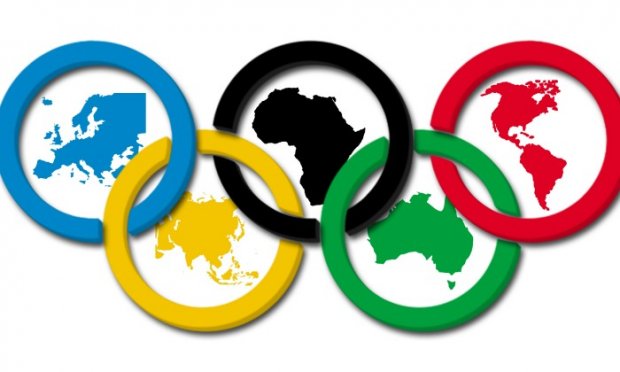
This term our context is: 'Spirit of Kotahitanga' where we will be exploring the Paris Olympics 2024.
EXPLORE / TŪHURA learning intentions:
- We are EXPLORING the social, political and economical impact of inclusion and exclusion at the Olympics
- We are EXPLORING how groups take action in response to inclusion and/or exclusion
- We are EXPLORING some key Olympic moments since the 19th century
- We are EXPLORING how groups of people have sought to highlight issues/injustices by means of protest or using their voice
- We are EXPLORING barriers groups may face in attending/participating in the Olympics
- We are EXPLORING positive impacts of the Olympic movement
- We are EXPLORING Aotearoa New Zealand's involvement in the Olympic movement over time
Success Criteria: I can ...
• Identify groups that are excluded from the Paris 2024 Olympics
• Identify how Russian athletes have responded to sanctions
• Identify key Olympic moments using a timeline
• Identify concerns and controversies related to the Olympics
• Identify economic benefits of Olympics and Paralympic gamesClass Activities:
This week ...
1. We are continuing with the assessment
2. Add Learner evidence.
3. Do the weekly quiz.
Enjoy your assessment! 🚣🏻♀️🚣🏻🥇🥈🥉
-
-
Opened: Friday, 7 June 2024, 3:30 PMDue: Friday, 21 June 2024, 4:30 PM
-
-

Welcome back after the holidays! This term our context is: 'Spirit of Kotahitanga' where we will be exploring the Paris Olympics 2024.
EXPLORE / TŪHURA learning intentions:
- We are EXPLORING the social, political and economical impact of inclusion and exclusion at the Olympics
- We are EXPLORING how groups take action in response to inclusion and/or exclusion
- We are EXPLORING some key Olympic moments since the 19th century
- We are EXPLORING how groups of people have sought to highlight issues/injustices by means of protest or using their voice
- We are EXPLORING barriers groups may face in attending/participating in the Olympics
- We are EXPLORING positive impacts of the Olympic movement
- We are EXPLORING Aotearoa New Zealand's involvement in the Olympic movement over time
Success Criteria: I can ...
• Identify groups that are excluded from the Paris 2024 Olympics
• Identify how Russian athletes have responded to sanctions
• Identify key Olympic moments using a timeline
• Identify concerns and controversies related to the Olympics
• Identify economic benefits of Olympics and Paralympic gamesClass Activities:
This week ...
1. Look at the activity sheet/map of the world and where the Olympic games was hosted over the years.
2. Look at how many countries hosted more then once.
3. Look at the timeframe between the hosting of the same countries.
4. Draw a line from the countries names to the countries on the map accurately.
5. Enjoy the fun mapping skills! 🌎🌍🌏
6. Do the weekly quiz. -

Welcome back after the holidays! This term our context is: 'Spirit of Kotahitanga' where we will be exploring the Paris Olympics 2024.
EXPLORE / TŪHURA learning intentions:
- We are EXPLORING the social, political and economical impact of inclusion and exclusion at the Olympics
- We are EXPLORING how groups take action in response to inclusion and/or exclusion
- We are EXPLORING some key Olympic moments since the 19th century
- We are EXPLORING how groups of people have sought to highlight issues/injustices by means of protest or using their voice
- We are EXPLORING barriers groups may face in attending/participating in the Olympics
- We are EXPLORING positive impacts of the Olympic movement
- We are EXPLORING Aotearoa New Zealand's involvement in the Olympic movement over time
Success Criteria: I can ...
• Identify groups that are excluded from the Paris 2024 Olympics
• Identify how Russian athletes have responded to sanctions
• Identify key Olympic moments using a timeline
• Identify concerns and controversies related to the Olympics
• Identify economic benefits of Olympics and Paralympic gamesClass Activities:
This week ...
1. Read and discuss the following activity: From raised fists at the 1968 Olympics to taking the knee: A history of racial justice protests in sport.
a) How groups took action in response to inclusion and/or exclusion.
2. Create a google slide and share with: lvisagie@mhjc.school.nz
3. Information to add:
b) How groups of people have sought to highlight issues/injustices by means of protest or using their voice.
c) Barriers groups may face in attending/participating in the Olympics.
d) Identify three positive and negative points.
e) Aotearoa New Zealand's involvement in the Olympic movement over time.
4. Do the weekly quiz. -

This term our context is: 'Spirit of Kotahitanga' where we will be exploring the Paris Olympics 2024.
EXPLORE / TŪHURA learning intentions:
- We are EXPLORING the social, political and economical impact of inclusion and exclusion at the Olympics
- We are EXPLORING how groups take action in response to inclusion and/or exclusion
- We are EXPLORING some key Olympic moments since the 19th century
- We are EXPLORING how groups of people have sought to highlight issues/injustices by means of protest or using their voice
- We are EXPLORING barriers groups may face in attending/participating in the Olympics
- We are EXPLORING positive impacts of the Olympic movement
- We are EXPLORING Aotearoa New Zealand's involvement in the Olympic movement over time
Success Criteria: I can ...
• Identify groups that are excluded from the Paris 2024 Olympics
• Identify how Russian athletes have responded to sanctions
• Identify key Olympic moments using a timeline
• Identify concerns and controversies related to the Olympics
• Identify economic benefits of Olympics and Paralympic gamesClass Activities:
This week ...
1. We are doing research and writing an essay about: The economic benefits of Olympic games and;
2. The concerns related to the environment and the impact on the environment.To be completed in your books!
-

This term our context is: 'Spirit of Kotahitanga' where we will be exploring the Paris Olympics 2024.
EXPLORE / TŪHURA learning intentions:
- We are EXPLORING the social, political and economical impact of inclusion and exclusion at the Olympics
- We are EXPLORING how groups take action in response to inclusion and/or exclusion
- We are EXPLORING some key Olympic moments since the 19th century
- We are EXPLORING how groups of people have sought to highlight issues/injustices by means of protest or using their voice
- We are EXPLORING barriers groups may face in attending/participating in the Olympics
- We are EXPLORING positive impacts of the Olympic movement
- We are EXPLORING Aotearoa New Zealand's involvement in the Olympic movement over time
Success Criteria: I can ...
• Identify groups that are excluded from the Paris 2024 Olympics
• Identify how Russian athletes have responded to sanctions
• Identify key Olympic moments using a timeline
• Identify concerns and controversies related to the Olympics
• Identify economic benefits of Olympics and Paralympic gamesClass Activities:
This week ...
1. We are doing a timeline about Aotearoa New Zealand's involvement in the Olympic movement over time (amount of medals, positions and in which sports).
2. Start your time line at 1920 and end at 2024.
3. Do presentations of your Google slide show to the class.
Have fun! Be creative! Use Canva please. Print your timeline when you are done and glue it in your book.
-

This term our context is: 'Spirit of Kotahitanga' where we will be exploring the Paris Olympics 2024.
EXPLORE / TŪHURA learning intentions:
- We are EXPLORING the social, political and economical impact of inclusion and exclusion at the Olympics
- We are EXPLORING how groups take action in response to inclusion and/or exclusion
- We are EXPLORING some key Olympic moments since the 19th century
- We are EXPLORING how groups of people have sought to highlight issues/injustices by means of protest or using their voice
- We are EXPLORING barriers groups may face in attending/participating in the Olympics
- We are EXPLORING positive impacts of the Olympic movement
- We are EXPLORING Aotearoa New Zealand's involvement in the Olympic movement over time
Success Criteria: I can ...
• Identify groups that are excluded from the Paris 2024 Olympics
• Identify how Russian athletes have responded to sanctions
• Identify key Olympic moments using a timeline
• Identify concerns and controversies related to the Olympics
• Identify economic benefits of Olympics and Paralympic gamesClass Activities:
This week ...
1. We are EXPLORING the social, political and economical impact of inclusion and exclusion at the Olympics.
2. Do research and create a pros and cons table about the Social, political and economical impact of the Olympics on the world.
3. Do the weekly quiz.
Have fun! Use Canva please. Print your tables once completed and glue it in your book.
-

This term our context is: 'Spirit of Kotahitanga' where we will be exploring the Paris Olympics 2024.
EXPLORE / TŪHURA learning intentions:
- We are EXPLORING the social, political and economical impact of inclusion and exclusion at the Olympics
- We are EXPLORING how groups take action in response to inclusion and/or exclusion
- We are EXPLORING some key Olympic moments since the 19th century
- We are EXPLORING how groups of people have sought to highlight issues/injustices by means of protest or using their voice
- We are EXPLORING barriers groups may face in attending/participating in the Olympics
- We are EXPLORING positive impacts of the Olympic movement
- We are EXPLORING Aotearoa New Zealand's involvement in the Olympic movement over time
Success Criteria: I can ...
• Identify groups that are excluded from the Paris 2024 Olympics
• Identify how Russian athletes have responded to sanctions
• Identify key Olympic moments using a timeline
• Identify concerns and controversies related to the Olympics
• Identify economic benefits of Olympics and Paralympic gamesClass Activities:
This week ...
1. We are EXPLORING the social, political and economical impact of inclusion and exclusion at the Olympics.
2. Do research and create a pros and cons table about the Social, political and economical impact of the Olympics on the world.
3. Do the weekly quiz.
Have fun! Use Canva please. Print your tables once completed and glue it in your book.
-

This term our context is: 'Spirit of Kotahitanga' where we will be exploring the Paris Olympics 2024.
EXPLORE / TŪHURA learning intentions:
- We are EXPLORING the social, political and economical impact of inclusion and exclusion at the Olympics
- We are EXPLORING how groups take action in response to inclusion and/or exclusion
- We are EXPLORING some key Olympic moments since the 19th century
- We are EXPLORING how groups of people have sought to highlight issues/injustices by means of protest or using their voice
- We are EXPLORING barriers groups may face in attending/participating in the Olympics
- We are EXPLORING positive impacts of the Olympic movement
- We are EXPLORING Aotearoa New Zealand's involvement in the Olympic movement over time
Success Criteria: I can ...
• Identify groups that are excluded from the Paris 2024 Olympics
• Identify how Russian athletes have responded to sanctions
• Identify key Olympic moments using a timeline
• Identify concerns and controversies related to the Olympics
• Identify economic benefits of Olympics and Paralympic gamesClass Activities:
This week ...
1. We are starting with the assessment
2. Add Learner evidence.
3. Do the weekly quiz.
Enjoy your assessment! 🚣🏻♀️🚣🏻🥇🥈🥉
-

This term our context is: 'Spirit of Kotahitanga' where we will be exploring the Paris Olympics 2024.
EXPLORE / TŪHURA learning intentions:
- We are EXPLORING the social, political and economical impact of inclusion and exclusion at the Olympics
- We are EXPLORING how groups take action in response to inclusion and/or exclusion
- We are EXPLORING some key Olympic moments since the 19th century
- We are EXPLORING how groups of people have sought to highlight issues/injustices by means of protest or using their voice
- We are EXPLORING barriers groups may face in attending/participating in the Olympics
- We are EXPLORING positive impacts of the Olympic movement
- We are EXPLORING Aotearoa New Zealand's involvement in the Olympic movement over time
Success Criteria: I can ...
• Identify groups that are excluded from the Paris 2024 Olympics
• Identify how Russian athletes have responded to sanctions
• Identify key Olympic moments using a timeline
• Identify concerns and controversies related to the Olympics
• Identify economic benefits of Olympics and Paralympic gamesClass Activities:
This week ...
1. We are continuing with the assessment
2. Continue with assessment.
3. Do the weekly quiz.
Enjoy your assessment! 🚣🏻♀️🚣🏻🥇🥈🥉
-
Opened: Wednesday, 4 September 2024, 4:30 AMDue: Friday, 20 September 2024, 4:30 PM
-

This term our context is: 'Spirit of Kotahitanga' where we will be exploring the Paris Olympics 2024.
EXPLORE / TŪHURA learning intentions:
- We are EXPLORING the social, political and economical impact of inclusion and exclusion at the Olympics
- We are EXPLORING how groups take action in response to inclusion and/or exclusion
- We are EXPLORING some key Olympic moments since the 19th century
- We are EXPLORING how groups of people have sought to highlight issues/injustices by means of protest or using their voice
- We are EXPLORING barriers groups may face in attending/participating in the Olympics
- We are EXPLORING positive impacts of the Olympic movement
- We are EXPLORING Aotearoa New Zealand's involvement in the Olympic movement over time
Success Criteria: I can ...
• Identify groups that are excluded from the Paris 2024 Olympics
• Identify how Russian athletes have responded to sanctions
• Identify key Olympic moments using a timeline
• Identify concerns and controversies related to the Olympics
• Identify economic benefits of Olympics and Paralympic gamesClass Activities:
Kia ora everyone.
This week we are focusing on: Around the world - Map Task
1. Around the world - Map Task
2. Around the world - Map Task
3. Do the weekly quiz.
Have fun! :)
Link: World Map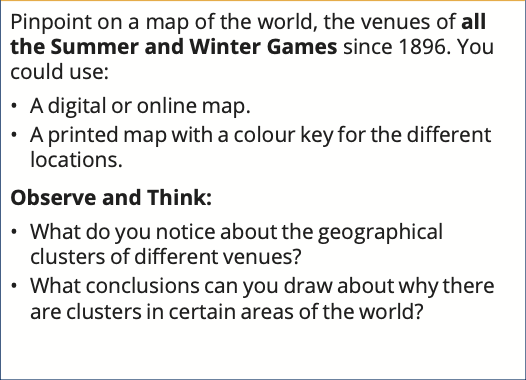
-
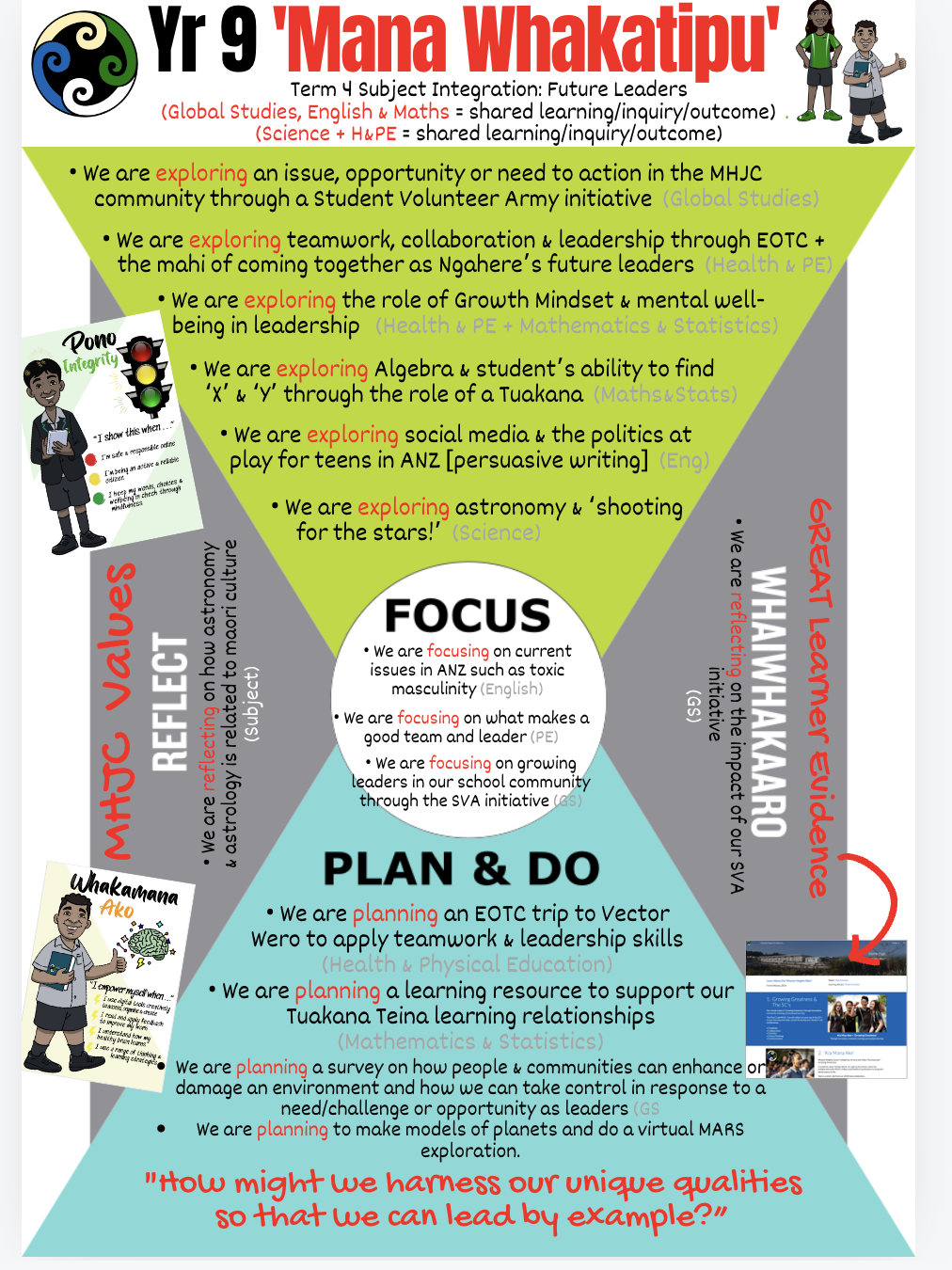
Kia ora! Welcome back after the holidays! I wish you the best for this term and the upcoming CAT's!
EXPLORE / TŪHURA learning intentions:
- We are EXPLORING People & Communities by comparing the perspectives/values and how these influence outcomes for communities.
- We are EXPLORING People & Communities by comparing ways in which we interact with the Environment and Communities.
- We are EXPLORING People & Communities by researching the impact humans have on the Environment and Communities.
- We are EXPLORING People & Communities by identifying different ways we can sustainably use or interact with the Environment and Communities.
Context: 'Mana Whakatipu'
MHJC Values: Pono/Intergrity - I am being a active and reliable citizen
Awhinatanga/Compassion - I am making a differenceWhakataukī: "Tiakina te whenua o ō tūpuna"
Metaphorical: Mine is the land of my ancestors.
Literal: This whakatauki refers to care for the land of your ancestors. It explains that we have a responsibility for our land and environment, and that this is not an 'optional' responsibility.Paearu Angitu (Success Criteria): I can...
- I can define key words related to conservation
- I can identify the ways humans impact that people & communities can enhance or damage an environment
- I can examine different methods of protecting and conserving the environment and evaluate how sustainable each method is
- I can recognise what sustainable environmental justice use is
- I can identify the different values & uses of Student Volunteer Army
Hei Mahi (Activities):
- Session 1: Conservation terminology on Google classroom
- Session 2: Complete terminology task and look at local reserves on Google maps
- Session 3: Weekly quiz
Mahi Kāinga (Homework/Further Learning):
- Write here
-
Kia ora! Welcome back after the holidays! I wish you the best for this term and the upcoming CAT's!
EXPLORE / TŪHURA learning intentions:
- We are EXPLORING People & Communities by comparing the perspectives/values and how these influence outcomes for communities.
- We are EXPLORING People & Communities by comparing ways in which we interact with the Environment and Communities.
- We are EXPLORING People & Communities by researching the impact humans have on the Environment and Communities.
- We are EXPLORING People & Communities by identifying different ways we can sustainably use or interact with the Environment and Communities.
Context: "Mana Whakatipu'
MHJC Values: Pono/Intergrity - I am being a active and reliable citizen
Awhinatanga/Compassion - I am making a differenceWhakataukī: "Tiakina te whenua o ō tūpuna"
Metaphorical: Mine is the land of my ancestors.
Literal: This whakatauki refers to care for the land of your ancestors. It explains that we have a responsibility for our land and environment, and that this is not an 'optional' responsibility.
Paearu Angitu (Success Criteria): I can...
- I can define key words related to conservation
- I can identify the ways humans impact that people & communities can enhance or damage an environment
- I can examine different methods of protecting and conserving the environment and evaluate how sustainable each method is
- I can recognise what sustainable environmental justice use is
- I can identify the different values & uses of Student Volunteer Army
Hei Mahi (Activities):
- Session 1: Conservation survey
- Session 2: Conservation survey task, create a google form
- Session 3: Weekly quiz
Mahi Kāinga (Homework/Further Learning):
- Write here
-
Kia ora! Welcome back after the holidays! I wish you the best for this term and the upcoming CAT's!
EXPLORE / TŪHURA learning intentions:
- We are EXPLORING People & Communities by comparing the perspectives/values and how these influence outcomes for communities.
- We are EXPLORING People & Communities by comparing ways in which we interact with the Environment and Communities.
- We are EXPLORING People & Communities by researching the impact humans have on the Environment and Communities.
- We are EXPLORING People & Communities by identifying different ways we can sustainably use or interact with the Environment and Communities.
Context: "Mana Whakatipu'
MHJC Values: Pono/Intergrity - I am being a active and reliable citizen
Awhinatanga/Compassion - I am making a differenceWhakataukī: "Tiakina te whenua o ō tūpuna"
Metaphorical: Mine is the land of my ancestors.
Literal: This whakatauki refers to care for the land of your ancestors. It explains that we have a responsibility for our land and environment, and that this is not an 'optional' responsibility.
Paearu Angitu (Success Criteria): I can...
- I can define key words related to conservation
- I can identify the ways humans impact that people & communities can enhance or damage an environment
- I can examine different methods of protecting and conserving the environment and evaluate how sustainable each method is
- I can recognise what sustainable environmental justice use is
- I can identify the different values & uses of Student Volunteer Army
Hei Mahi (Activities):
- Session 1: Weekly quiz
- Session 2: Conservation survey task
- Session 3: Athletics day
Mahi Kāinga (Homework/Further Learning):
- Write here
-
Kia ora! Welcome back after the holidays! I wish you the best for this term and the upcoming CAT's!
EXPLORE / TŪHURA learning intentions:
- We are EXPLORING People & Communities by comparing the perspectives/values and how these influence outcomes for communities.
- We are EXPLORING People & Communities by comparing ways in which we interact with the Environment and Communities.
- We are EXPLORING People & Communities by researching the impact humans have on the Environment and Communities.
- We are EXPLORING People & Communities by identifying different ways we can sustainably use or interact with the Environment and Communities.
Context: "Mana Whakatipu'
MHJC Values: Pono/Intergrity - I am being a active and reliable citizen
Awhinatanga/Compassion - I am making a differenceWhakataukī: "Tiakina te whenua o ō tūpuna"
Metaphorical: Mine is the land of my ancestors.
Literal: This whakatauki refers to care for the land of your ancestors. It explains that we have a responsibility for our land and environment, and that this is not an 'optional' responsibility.
Paearu Angitu (Success Criteria): I can...
- I can define key words related to conservation
- I can identify the ways humans impact that people & communities can enhance or damage an environment
- I can examine different methods of protecting and conserving the environment and evaluate how sustainable each method is
- I can recognise what sustainable environmental justice use is
- I can identify the different values & uses of Student Volunteer Army
Hei Mahi (Activities):
- Session 1: CAT preparation
- Session 2: CAT preparation
- Session 3: Weekly quiz
Mahi Kāinga (Homework/Further Learning):
- Write here
-
Kia ora! Welcome back after the holidays! I wish you the best for this term and the upcoming CAT's!
EXPLORE / TŪHURA learning intentions:
- We are EXPLORING People & Communities by comparing the perspectives/values and how these influence outcomes for communities.
- We are EXPLORING People & Communities by comparing ways in which we interact with the Environment and Communities.
- We are EXPLORING People & Communities by researching the impact humans have on the Environment and Communities.
- We are EXPLORING People & Communities by identifying different ways we can sustainably use or interact with the Environment and Communities.
Context: "Mana Whakatipu'
MHJC Values: Pono/Intergrity - I am being a active and reliable citizen
Awhinatanga/Compassion - I am making a differenceWhakataukī: "Tiakina te whenua o ō tūpuna"
Metaphorical: Mine is the land of my ancestors.
Literal: This whakatauki refers to care for the land of your ancestors. It explains that we have a responsibility for our land and environment, and that this is not an 'optional' responsibility.
Paearu Angitu (Success Criteria): I can...
- I can define key words related to conservation
- I can identify the ways humans impact that people & communities can enhance or damage an environment
- I can examine different methods of protecting and conserving the environment and evaluate how sustainable each method is
- I can recognise what sustainable environmental justice use is
- I can identify the different values & uses of Student Volunteer Army
Hei Mahi (Activities):
- Session 1: CAT preparation
- Session 2: CAT preparation
- Session 3: Weekly quiz
Mahi Kāinga (Homework/Further Learning):
- CAT preparation
-
Kia ora! Welcome back after the holidays! I wish you the best for this term and the upcoming CAT's!
EXPLORE / TŪHURA learning intentions:
- We are EXPLORING People & Communities by comparing the perspectives/values and how these influence outcomes for communities.
- We are EXPLORING People & Communities by comparing ways in which we interact with the Environment and Communities.
- We are EXPLORING People & Communities by researching the impact humans have on the Environment and Communities.
- We are EXPLORING People & Communities by identifying different ways we can sustainably use or interact with the Environment and Communities.
Context: "Mana Whakatipu'
MHJC Values: Pono/Intergrity - I am being a active and reliable citizen
Awhinatanga/Compassion - I am making a differenceWhakataukī: "Tiakina te whenua o ō tūpuna"
Metaphorical: Mine is the land of my ancestors.
Literal: This whakatauki refers to care for the land of your ancestors. It explains that we have a responsibility for our land and environment, and that this is not an 'optional' responsibility.
Paearu Angitu (Success Criteria): I can...
- I can define key words related to conservation
- I can identify the ways humans impact that people & communities can enhance or damage an environment
- I can examine different methods of protecting and conserving the environment and evaluate how sustainable each method is
- I can recognise what sustainable environmental justice use is
- I can identify the different values & uses of Student Volunteer Army
Hei Mahi (Activities):
- Session 1: CAT
- Session 2: CAT
- Session 3: CAT
Mahi Kāinga (Homework/Further Learning):
- CAT preparation
-
Kia ora! Welcome back after the holidays! I wish you the best for this term and the upcoming CAT's!
EXPLORE / TŪHURA learning intentions:
- We are EXPLORING People & Communities by comparing the perspectives/values and how these influence outcomes for communities.
- We are EXPLORING People & Communities by comparing ways in which we interact with the Environment and Communities.
- We are EXPLORING People & Communities by researching the impact humans have on the Environment and Communities.
- We are EXPLORING People & Communities by identifying different ways we can sustainably use or interact with the Environment and Communities.
Context: "Mana Whakatipu'
MHJC Values: Pono/Intergrity - I am being a active and reliable citizen
Awhinatanga/Compassion - I am making a differenceWhakataukī: "Tiakina te whenua o ō tūpuna"
Metaphorical: Mine is the land of my ancestors.
Literal: This whakatauki refers to care for the land of your ancestors. It explains that we have a responsibility for our land and environment, and that this is not an 'optional' responsibility.
Paearu Angitu (Success Criteria): I can...
- I can define key words related to conservation
- I can identify the ways humans impact that people & communities can enhance or damage an environment
- I can examine different methods of protecting and conserving the environment and evaluate how sustainable each method is
- I can recognise what sustainable environmental justice use is
- I can identify the different values & uses of Student Volunteer Army
Hei Mahi (Activities):
- Session 1: Post CAT class discussion
- Session 2: Survey task
- Session 3: Weekly quiz, survey task
Mahi Kāinga (Homework/Further Learning):
-
Kia ora! Welcome back after the holidays! I wish you the best for this term and the upcoming CAT's!
EXPLORE / TŪHURA learning intentions:
- We are EXPLORING People & Communities by comparing the perspectives/values and how these influence outcomes for communities.
- We are EXPLORING People & Communities by comparing ways in which we interact with the Environment and Communities.
- We are EXPLORING People & Communities by researching the impact humans have on the Environment and Communities.
- We are EXPLORING People & Communities by identifying different ways we can sustainably use or interact with the Environment and Communities.
Context: "Mana Whakatipu'
MHJC Values: Pono/Intergrity - I am being a active and reliable citizen
Awhinatanga/Compassion - I am making a differenceWhakataukī: "Tiakina te whenua o ō tūpuna"
Metaphorical: Mine is the land of my ancestors.
Literal: This whakatauki refers to care for the land of your ancestors. It explains that we have a responsibility for our land and environment, and that this is not an 'optional' responsibility.
Paearu Angitu (Success Criteria): I can...
- I can define key words related to conservation
- I can identify the ways humans impact that people & communities can enhance or damage an environment
- I can examine different methods of protecting and conserving the environment and evaluate how sustainable each method is
- I can recognise what sustainable environmental justice use is
- I can identify the different values & uses of Student Volunteer Army
Hei Mahi (Activities):
- Session 1: Weekly quiz/survey task
- Session 2: Survey task
- Session 3: Big day out
Mahi Kāinga (Homework/Further Learning):
-
Kia ora! Welcome back after the holidays! I wish you the best for this term and the upcoming CAT's!
EXPLORE / TŪHURA learning intentions:
- We are EXPLORING People & Communities by comparing the perspectives/values and how these influence outcomes for communities.
- We are EXPLORING People & Communities by comparing ways in which we interact with the Environment and Communities.
- We are EXPLORING People & Communities by researching the impact humans have on the Environment and Communities.
- We are EXPLORING People & Communities by identifying different ways we can sustainably use or interact with the Environment and Communities.
Context: "Mana Whakatipu'
MHJC Values: Pono/Intergrity - I am being a active and reliable citizen
Awhinatanga/Compassion - I am making a differenceWhakataukī: "Tiakina te whenua o ō tūpuna"
Metaphorical: Mine is the land of my ancestors.
Literal: This whakatauki refers to care for the land of your ancestors. It explains that we have a responsibility for our land and environment, and that this is not an 'optional' responsibility.
Paearu Angitu (Success Criteria): I can...
- I can define key words related to conservation
- I can identify the ways humans impact that people & communities can enhance or damage an environment
- I can examine different methods of protecting and conserving the environment and evaluate how sustainable each method is
- I can recognise what sustainable environmental justice use is
- I can identify the different values & uses of Student Volunteer Army
Hei Mahi (Activities):
- Session 1: Assembly
- Session 2: CAT paper final review
- Session 3: Holiday
Mahi Kāinga (Homework/Further Learning):

